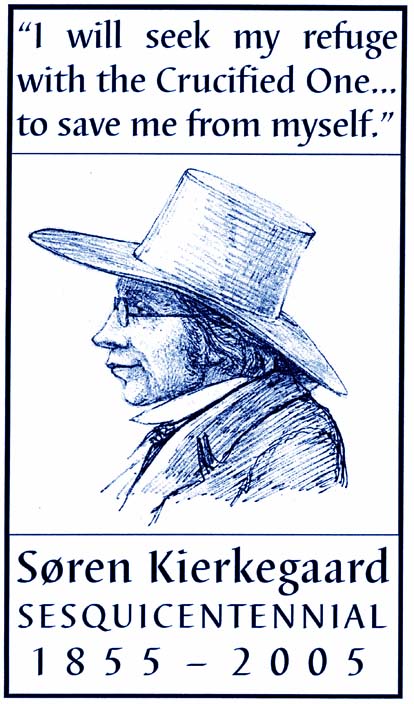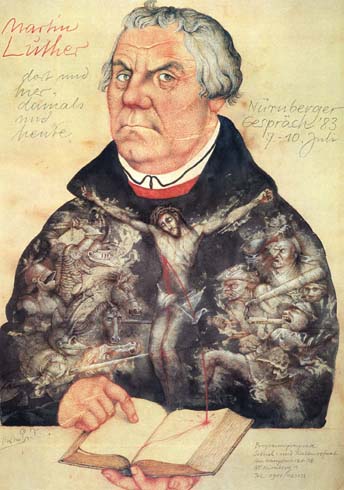|

Praying With
Kierkegaard
Selected
& Titled by the Rev. Ronald F. Marshall
December
2005
[1]
Godly Blindness. Lord, give us weak eyes for things of little worth, and eyes
clear-sighted in all of your truth [KW 19:3].
[2]
Godly Burdens. Lord God, you know our cares better than we ourselves know them, you
know how easily the apprehensive mind is predisposed to premature and
self-induced worries. We beseech you to give us the insight to see
through their prematureness and pride and to disdain them – these
busy, self-induced cares, but we pray that we may humbly accept from
your hand the cares that you yourself lay upon us and that you will give
us the strength to bear them [JP 3:3382].
[3]
Shatter Our Idols. Lord, make
our hearts into your temple, in which you take up residence. Let every
unclean thought, every terrestrial desire be found shattered, like the
idol Dagon, each morning at the base of the Ark of the Covenant. Teach
us to master our flesh and blood, and let it be blood sacrifice, so that
we may say with the apostles: I die daily [JP 3:3374].
[4]
Learning the Language of Loss.
Father in heaven! Have a little patience with us, for we often think in
all sincerity that we are talking with you and yet talk so foolishly.
Sometimes what happens to us is so good (in our way of thinking) that we
do not have enough words to thank you – like a cunning child who
thanks because it has gotten its way. Then again things go badly and we
cry to you, if we do not wail and screech – alas, like a foolish child
who is afraid of what benefits him. But no matter… how childish we
are, no matter how little our speech and our language resemble the
language we should learn from you, this much we still understand –
that it should not be this way… [JP 3:3413].
[5]
Words of Pain & Joy. Yes,
honor to [the Virgin Mary]! O my God, when the message comes to her: You
will live your life scorned by other maidens, treated as a frivolous,
conceited wench or a poor, half-crazy wretch or a loose woman, and so on
– after that you will be exposed to all possible suffering, and
finally, because it seems as if God, too, has deceived you, a sword will
pierce your heart – this is the glad tidings. Yes, honor to her – to
be able to say promptly, without a moment’s consideration: Behold, I
am the handmaid of the Lord, and then to be able to sing the song of
praise: Henceforth all generations will call me blessed. O my God, this
is quite different from being able to speak perfectly all the living and
dead languages (as our educated girls do); this is speaking in tongues
[JP 3:2674].
[6]
Good Nothingness. God in heaven, let me rightly feel my nothingness, not to despair over
it, but all the more intensely to feel the greatness of your goodness
[JP 3:3378].
[7]
Hating Myself Properly. My
Lord and Savior, you whose love hides a multitude of sins, when I really
am aware of my sin and the multitude of my sins, when before justice in
heaven there is only wrath over me and over my life, when here on earth
there is only one person I hate and detest, one person I would flee to
the ends of the earth to avoid – myself – then I will not begin the
futile attempt that only leads either more deeply into despair or to
madness, but I will promptly flee to you, and you will not deny me the
hiding place [1 Peter 4:8] you have lovingly offered to all; you will
shield me from the eyes of justice, rescue me from this person and from
the recollection with which he tortures me; you will help me to dare –
by becoming a changed, a different, a better person – to remain in my
hiding place, forgotten by justice and by that person I detest [KW
18:187].
[8]
Becoming Humble. …Merciful God and Father!…. Teach us the properly humble
discernment of understanding so that – like the broken sinner who
sighs under his guilt, saying: It is impossible, it is impossible that
God can have mercy on me in this way – in the very same way he who in
faith appropriates this mercy to himself must say in his joy: It is
impossible….O lazy human discernment, O deceitful mortal wisdom, O
dull, dead thoughts of slumbering faith, O wretched forgetfulness of a
cold heart – no, Lord, preserve every believer in the properly humble
discernment of understanding and deliver him from evil! [JP 3:3409].
[9]
Wanting True Healing. Father
in heaven! So often the congregation brings its intercessions to you for
all who are sick and sorrowing…. Grant that each one of us may rightly
become aware of which sickness is the sickness unto death, and of how we
are all sick in this way! And you, our Lord Jesus Christ, you who came
to the world to heal those who suffer this sickness,…. Help us in this
sickness to turn to you to be healed. And you, God the Holy Spirit, you
who come to our assistance if we honestly want to be healed: Be with us
so that we never to our own ruination elude the physician’s help but
remain with him… [JP 3:3423].
[10]
Fighting for Love. Father in
heaven! You loved us first. Help us never to forget that you are love,
so that this full conviction might be victorious in our hearts over the
world’s allurements, the mind’s unrest, the anxieties over the
future, the horrors of the past, the needs of the moment. O, grant also
that this conviction might form our minds so that our hearts become
constant and true in love to them whom you bid us to love as ourselves
[JP 3:3394].
[11]
Awakening Well. Father in heaven! When the thought of you awakens in our soul, let it
not awaken like a terrified bird that flutters about in confusion, but
like a child from its sleep, with a heavenly smile [JP 3:3372].
[12]
Becoming a Believer. Father in
heaven!…. We pray… that you will form the hearts of those who live
without God in the world, so that they might seek you; the hearts of
those who seek you that they might wait upon you; the hearts of those
who wait upon you that they might find you; and the hearts of those that
find you that they might give away everything in order to buy what they
possess and that nothing might tear you from them or them from you until
their final blessed end… [JP 3:3399].
[13]
That Preachers May Honestly Believe.
We pray for those who are servants of the Word, those whose task it is,
as far as a human being is capable of it, to draw people to you. We pray
that you will bless their task, but also that in this task of theirs
they themselves may be drawn to you, that in their zeal to draw others
to you they themselves are not held back from you. [KW 20:262].
[14]
Separated Yet Hopeful. Lord,
my God, I really have nothing at all for which to pray to you; even if
you would promise to grant my every wish, I really cannot think of
anything – except that I may remain with you, as near as possible in
this time of separation in which you and I are living, and entirely with
you in all eternity [KW 5:392].
[15]
Without Answers. And when at times, O Lord, it is as if you paid no attention to my
voice, paid no attention to my lamentation, my sigh, my thank-you – I
will still continue praying to you until you hear my thanksgiving
because you have listened to me! [JP 3:3387].
[16]
Our Fault – Not God’s.
…Grant,… O God, that we may do our best to combat the absence of
spirit which wants to delude us into thinking that you are absent, in
order that, for the sake of collecting and building up the mind,
disciplining and purifying the mind, we may keep in mind that you are
always present [JP 3:3410].
[17]
Our Spiritual Wasteland. We
human beings carry the holy only in fragile jars, but you, O Holy
Spirit, when you live in a man you live in what is infinitely inferior:
you Spirit of Holiness, you live in our filth and impurity, you Spirit
of Wisdom, you live in our foolishness, you Spirit of Truth, you live in
our self-deception! O, stay here,… you, who creating and giving new
birth, make your own dwelling place, O, stay here that it may at some
time come to be that you are delighted with the house you yourself
prepared for yourself in my filthy and foolish and cheating heart [JP
3:3445].
[18]
Comfort With Divine Discrimination.
Lord Jesus Christ, you who loved us first, you who until the last loved
those whom you had loved from the beginning, you who until the end of
time continue to love everyone who wants to belong to you – your
faithfulness cannot deny itself. Alas, only when a person denies you can
he force you, so to speak, you the loving one, also to deny him. May
this be our comfort when we must indict ourselves for the offense we
have committed, for what we have left undone, for our weakness in
temptation, for our slow progress in the good, that is, for our
unfaithfulness to you, to whom we once in our early youth and repeatedly
thereafter promised faithfulness – may it be our comfort that even if
we are unfaithful you still remain faithful; you cannot deny yourself
[KW 17:282].
[19]
God’s Tough Love. Loving
Father, I am a total failure – and yet you are love. I even fail to
cling to this, that you are love – and yet you are love. No matter how
I turn, this is the one thing I cannot get away from or be free of –
that you are love. This is why I believe that even when I fail to cling
to this – that you are love – it is still out of love that you
permit it to happen, O infinite love [JP 3:3450].
[20]
Jesus Surpasses All of Creation.
Great are you, O God…. When under the arch of heaven I stand
surrounded by the wonders of creation, I rapturously and adoringly
praise your greatness, you who lightly hold the stars in the infinite
and concern yourself fatherly with the sparrow. But when we are gathered
here in your holy house we are also surrounded on all sides by what
calls to mind your greatness in a deeper sense. You are indeed great,
Creator and Sustainer of the world; but when you, O God, forgave the sin
of the world and reconciled yourself with the fallen human race, then
you were even greater in your incomprehensible compassion!… [KW
17:289].
[21]
Dwelling on Christ’s Teachings.
Would that you might so fill my thoughts, Lord Jesus Christ, that people
could look at me and tell that I am thinking of you…. Would that your
image might prevail upon me in such a way that I proclaim your teaching,
even though I am wretched, scorned, and ridiculed – then people would
see (… by my character) that I am thinking of you [JP 3:3449].
Understanding
Prayer
[A]
Praying in Jesus’ Name. …I
do not dare approach God except through an intermediary; if my prayer is
to be heard, it must be in the name of Jesus; it is this name which
gives it power…. I cannot pray in the name of Jesus about my own
will…. I dare put the name of Jesus to my prayer [to] picture him, his
holy will, together with what I am praying about… [JP 3:3441].
[B]
Jesus Matters Most. Let us not
forget in all [the glories of science] the one thing needful,…. that
we are saved by your Son [JP 3:3368].
[C]
Listening to God’s Will Most of All.
…The true prayer-relationship does not exist when God hears what is
being prayed about but when the pray-er continues to pray until he is the one who hears, who hears what God wills… [JP 3:3403].
[D]
Thanking God Most of All for Darkness.
If you delay, it… is not stinginess but fatherly thriftiness which
lays aside the best for the child in the safest place and for the most
opportune time. Lord God!…. How beautiful to thank when a man readily
understands that you give good and perfect gifts,… and even earthly
common sense quickly agrees. Yet it is still more blessed to give thanks
when life becomes a dark story,… when the heart is oppressed, when the
mind is darkened, when reason turns traitor in its ambiguity and memory
deceitful in forgetfulness, when self-love shrinks back in horror, when
prudence resists,… then it is more blessed to thank God. For the one
who gives thanks in this manner loves God… [JP 3:3405].
[E]
Struggle is Supreme. They are
beautiful, those words by St. Theresa,… “O, you blind ones, to
abandon prayer just when it ought to begin.” But that is how it goes.
In good days, when everything is so easy to understand, or it is assumed
that everything is so easy to understand, then they pray or think that
they pray. When adversity comes and praying becomes a struggle, that is,
becomes real prayer, then they abandon it [JP 3:3435].
[F]
Especially When Desperate.
Christ wept blood when he prayed – nowadays the preachers give three
reasons to prove that it is expedient to pray. – What if people were
forbidden to pray; then they probably would no longer need three
reasons. When parents have done everything to make their children happy
and they still are not happy, the parents take everything away from them
– it helps! [JP 3:3414].
[G]
Odd Breathing. The Church Fathers were right in observing that to pray is to breathe.
Here we see the stupidity of talking about a why, for why do I breathe? Because otherwise I would die – and so
it is with praying. Nor do I intend to change the world through my
breathing – I simply intend to replenish my vitality and be renewed – it is the same with prayer in relation to God [JP
3:3432].
[H]
Courage to Endure. …We
ordinary men pray God to end our suffering, to send us better times –
and that is how we find consolation in prayer. The witness to truth
prays God to give him strength to endure suffering; consequently he
prays himself more and more deeply into suffering; the more inwardly and
the more intimately he prays to God the more firmly he becomes immersed
in suffering. – Do you have the courage to pray this way? [JP 3:3462].
[I]
Taking Responsibility. Do you
really believe that the benediction which the pastor pronounces from the
holy altar works just as powerfully on those who inquisitively walk
around admiring the works of man (the statues) in the church as it does
on those who are gathered here in stillness to devote their attention to
God? …Are not you who in disbelief deny the validity of prayer not
guilty of superstition, for is it not superstitious to believe that God
would act upon man in a purely external way? [JP 3:3379].
[J]
Nurturing Faith. …Prayer is the daughter of faith, but the daughter must support the
mother [JP 3:3456].
[K]
Enduring Against the Odds. The
more a person prays, the more certain his final consolation is that God
has commanded that we shall pray; for God is so infinite that many times a person would
otherwise hardly dare to pray, however much he wanted to [JP 3:3427].
[L]
Praying So Long. It is said that James… had tough skin like a camel’s on his knees
from continually praying, that he could keep on praying for several
days. To our age this no doubt seems ridiculous, but we should
remember… what eloquence of heart, what fullness, goes along with
being able to pray so long without becoming weak, especially we who have
enough trouble in making one heartfelt prayer [JP 3:3365].
[M]
Unexpected Power. The Archimedean point outside the world is a prayer chamber where a
true man of prayer prays in all honesty – and he will move the
earth…. It is unbelievable what he achieves when he shuts his door [JP
3:3426].
[N]
Buoyed Up Before God. …By
praying a person… makes himself buoyant in relation to God; otherwise
God would completely overwhelm him [JP 3:3428].
[O]
Backing Off. …The whole
mistake in paganism … is that man relates directly to God as to
another person, a more powerful man, instead of man’s first relating
to God secondarily: after God has given everything for nothing [JP
3:3415].
[P]
Using Our Words Carefully. May
our words not be like flowers, which today stand in the meadow and
tomorrow are thrown in the furnace, not like flowers, even if their
splendor exceeds the glory of Solomon [JP 3:3367].
[Q]
Being Eloquent. It is said that earthly love makes one eloquent – how much more
should love of you, O God, make a man eloquent – you who yourself
formed man’s mouth for speech [JP 3:3388].
[R]
Using Our Poor Words. When
prayer is heard here on earth and mingles with busy human speech, it is
idle talk, but it is working in heaven; and frequently prayer does sow
in corruption [1 Corinthians 15:42-43], but nevertheless it harvests in
incorruption [JP 3:3396].
[S]
Beyond Duty. …There is a lot
of preaching about our duty to pray to God, but would it not be more
correct to point out to men the prodigious prerogative of being able to
talk with God [JP 3:3411].
[T]
Difficult Collecting. To pray
(to collect oneself) is a task for the whole soul, no easy matter [JP
3:3393].
[U]
Waking Up for Sure. How
difficult it is actually to be vigilant. One does not know whether he still is
awake, actually is awake, is sleeping internally [JP 3:3392].
[V]
Under Pressure is Best.
Imagine a girl in love. Which do you think she appreciates more – that
the beloved remembers her and thinks of her on a Sunday when he is
loafing and has nothing to do – or that the beloved has the time to
think of her when he is busiest of all and yet without neglecting
anything: in the same way prayer to God in the day of need is most
cherished and well-pleasing [JP 3:3424].
[W]
Letting Go. …In order to
pray in truth to God out of an honest heart we cannot deceitfully hide
anything in the secrecy of our being – not that we are trying to
deceive God, but we do not have the courage to confide it to him [JP
3:3386].
[X]
Exhausting Yourself. To pray
oneself out is something like crying oneself out, as we say. And when
you have prayed yourself out completely, then there is only one word
left: Amen [JP 3:3436].
[Y]
That Rare Amen. To say “Amen” in such a way that not one single word more can be
added,… after having said everything that lay on one’s heart –
that is, before God one has become transparent to himself in all his
weakness but also in all his hope,…. O, how seldom, how extremely
seldom this happens… [JP 3:3425].
[Z]
Beyond Prayer. …The blessedness of heaven is greater than praying [John 16:24] [JP
3:3421].
Caveat
Lector
Instead of all this
preaching about lofty virtues, faith, hope, and love,… someone ought
rather say something like this once:… Never let yourself be alone with
God lest you venture too far out, but see to it that your
God-relationship is like everybody else’s so that you can get someone
to assist you right away if God should leave you in the lurch….
Don’t go to church too often; never go alone to God, for that is
dangerous, he could make too strong an impression upon you,… for in
the relation to God you must always make sure of having something to
hold on to so that he does not absolutely reduce you to nothing. Never
pray to God in solitude, never so that your heart would prompt you to
boundless confidence – no, learn certain formulas which you know for
sure others have used to good advantage. [Now] if one were to talk this
way, he would talk far more accurately both with respect to the
situation of most of the listeners and their wants than if he used all
those high-flying phrases…. And then shut your eyes to everything else
and do not let yourself be disturbed by men [JP 2:1354].
Addendum
on Kierkegaard’s Prayers
Kierkegaard’s view of true
prayer implies a concept of false prayer. There is, for example, no true
prayer without suffering. False prayer asks relief from suffering. True
prayer asks the strength to bear it. False prayer falsely conceives of
God. It thinks God is changeable; it tempts God, but God neither tempts
nor can be tempted. It thinks God operates in terms of human conceptions
of good and evil, pleasant and unpleasant. It turns God into man writ
large, as if he could be persuaded, cajoled, bargained with. True prayer
is patient and persistent. False prayer is halting and impatient. The
individual who prays truly is humble and finds the experience of prayer
humbling. The individual who prays falsely bolsters his own self-esteem
and is presumptuous in his prayer. True prayer accepts everything and
refers everything to God. The one who prays falsely complains and then
gives thanks only for what he himself thinks is good. The true man of
prayer is totally committed. His opposite holds something back, or he
prays with only part of his being – his mind, his feelings, or his
public self. In valid prayer a man come alone before God. In immature
prayer the individual tries to maintain his dependencies on his fellow
man and his social world as a kind of protective device. True prayer
maintains the dialectical tension in man’s sense of the distance and
the nearness of God; false prayer either volatilizes the
God-relationship in a fantastically elevated conception of God or so
likens God to man that it treats God as a fellow human being. The man
who prays truly strips himself of all cleverness, while false prayer is
often an attempt at clever conversation…. The man who truly prays
listens to God; the man who prays falsely wants God to listen to him [LeFevre
221-222].
References
Søren
Kierkegaard’s Journals & Papers [JP] 7 vols., trans. and ed.
Howard V. and Edna H. Hong,
Bloomington
,
IN
: Indiana University Press, 1967-1978.
Kierkegaard’s Writings
[KW] 26 vols., trans. and ed. Howard V. and Edna H. Hong,
Princeton
,
NJ
: Princeton University Press, 1978-2000.
The Prayers of Kierkegaard,
ed. Perry D. LeFevre,
Chicago
,
IL
:
University
of
Chicago
, 1956.
Søren Kierkegaard: The
Mystique of Prayer and Prayer, trans. Lois S. Bowers, ed. George K.
Bowers,
Lima
,
OH
: CSS Publishing, 1994.

Our
Need for Kierkegaard:
A
Tribute
By
Pastor Marshall
Kierkegaard
was born in 1813 and raised a Lutheran in
Copenhagen, Denmark. He was highly
educated at the University and developed a love for words and
ratiocination – “the thorough kneading of reflection” (KW
14:111). In his book Stages
on Life’s Way (1845) he praises the Danish language
saying that it is “…not without expressions for the great,
the crucial, the eminent, yet has a lovely, a winsome, a genial
partiality for intermediate thoughts and subordinate ideas and
adjectives, and the small talk of moods and the humming of
transitions and the cordiality of inflections and the secret
exuberance of concealed well-being” (KW 11:489-490). These
words also reveal his manner of writing.
But
for all his learning and writing – nearly 30 books and
thousands of pages of journal entries – his heart was with the
ordinary fellow. Even though he was shy, he walked the streets
of
Copenhagen
chatting with strangers – keeping the night hours for his
secluded reading and writing. He didn’t court the public for
any political interests, but simply for “the disjunctions…
of good and evil, right and wrong, honesty and dishonesty,… of
which the common man had an unshakable and instinctive grasp,
quite apart from any reflection” [Jørgen Bukdahl, Søren
Kierkegaard and the Common Man, trans. Bruce H. Kirmmse
(1961; Grand Rapids, MI: Eerdmans, 2001) p. 63].
Kierkegaard
loved this instinct because he wanted to build a similar “intensity”
back into Christianity (JP 2:1807) since it had “become a
banality” (KW 22:78). So he took Matthew 7:13-14 to heart –
reading it “primitively” for character building (JP
3:2916-2917): that Christianity is difficult, and few practice
it aright. Christian faith doesn’t come from fine thinking but
from acting “according to the… orders of Christ” (JP
3:3023). And Jesus said we should strive to follow his narrow
way. This way opposes the easy life wherein “the gorgeous
poisonous flower of excuses blooms” (KW 15:153), for all other
ways are “wrong roads” (KW 15:299). They don’t “work
against” ourselves (KW 21:61) and our “mutually enchanting
defraudation of love” (KW 16:107) – as Christ’s true way
does. So “woe, woe to the Christian church” when it craves
being “victorious in this world,” for then “the way to
life is no longer narrow” and true (KW 20:223-224). For it’s
not a sign you’re on “the right way” when things are going
easily for you (KW 23:320).
So
thank God for Kierkegaard – and for Howard and Edna Hong who
have translated his books into English – as well as those who
have translated them into German, French, Spanish, Portuguese,
Dutch, Italian, Swedish, Norwegian, Chinese, Japanese, Korean,
Hungarian, Polish, Romanian, Bulgarian, Croatian, Russian,
Ukrainian, Czeck, Hebrew, Greek and Turkish (oclc.org). Truly
the world needs to hear from Kierkegaard “that Christianity
alone is able to give a solution to all the existential problems”
[G. Malantschulk, The
Controversial Kierkegaard, trans. Howard V. & Edna H.
Hong (1976; Wilfrid Laurie University Press, 1980) p. 74].
[reprinted
from “Kierkegaard’s Sesquicentennial,”
Lutheran
Forum 40
(Summer 2006) 17-19.]
|
|







